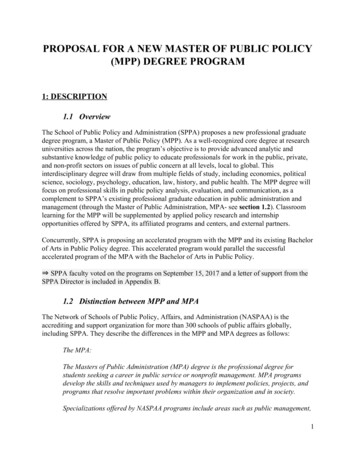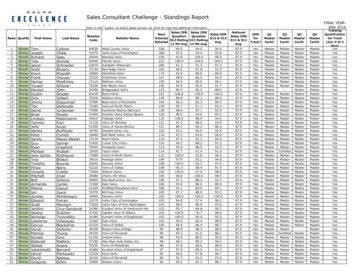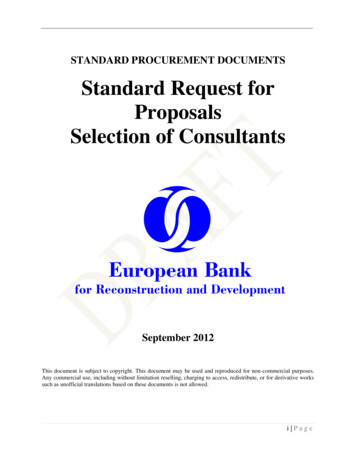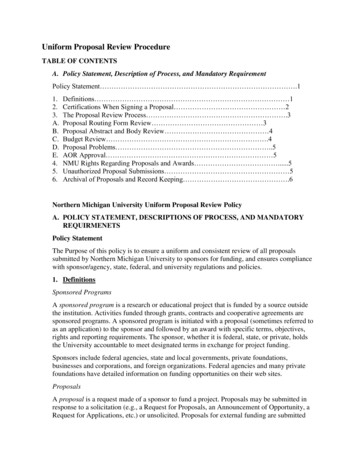
Transcription
PROPOSAL FOR A NEW MASTER OF PUBLIC POLICY(MPP) DEGREE PROGRAM1: DESCRIPTION1.1 OverviewThe School of Public Policy and Administration (SPPA) proposes a new professional graduatedegree program, a Master of Public Policy (MPP). As a well-recognized core degree at researchuniversities across the nation, the program’s objective is to provide advanced analytic andsubstantive knowledge of public policy to educate professionals for work in the public, private,and non-profit sectors on issues of public concern at all levels, local to global. Thisinterdisciplinary degree will draw from multiple fields of study, including economics, politicalscience, sociology, psychology, education, law, history, and public health. The MPP degree willfocus on professional skills in public policy analysis, evaluation, and communication, as acomplement to SPPA’s existing professional graduate education in public administration andmanagement (through the Master of Public Administration, MPA- see section 1.2 ). Classroomlearning for the MPP will be supplemented by applied policy research and internshipopportunities offered by SPPA, its affiliated programs and centers, and external partners.Concurrently, SPPA is proposing an accelerated program with the MPP and its existing Bachelorof Arts in Public Policy degree. This accelerated program would parallel the successfulaccelerated program of the MPA with the Bachelor of Arts in Public Policy. SPPA faculty voted on the programs on September 15, 2017 and a letter of support from theSPPA Director is included in Appendix B.1.2 Distinction between MPP and MPAThe Network of Schools of Public Policy, Affairs, and Administration (NASPAA) is theaccrediting and support organization for more than 300 schools of public affairs globally,including SPPA. They describe the differences in the MPP and MPA degrees as follows:The MPA:The Masters of Public Administration (MPA) degree is the professional degree forstudents seeking a career in public service or nonprofit management. MPA programsdevelop the skills and techniques used by managers to implement policies, projects, andprograms that resolve important problems within their organization and in society.Specializations offered by NASPAA programs include areas such as public management,1
nonprofit management, health care management, international development, urbanaffairs, human-resource management, state/local government administration, andfinancial management.The MPP:The Masters of Public Policy (MPP) degree is the professional degree for analyzing,evaluating, and solving all aspects of policy. As analysts and managers, MPP graduateswork with quantitative and qualitative data to develop, assess, and evaluate alternativeapproaches to current and emerging issues.Specializations offered by NASPAA programs include analysis in a myriad of publicpolicy areas, including: environmental, education, health, social, economic development,international, and urban policy.” In general, MPA programs place more emphasis on management and implementationtechniques, while MPP programs emphasize policy research and evaluation.1We propose to add an MPP degree following these general outlines. Both degrees would sharesome courses, thus reducing the resource requirements for starting a new degree program. Webelieve providing both degrees would better suit our prospective student body than the singleMPA degree.1.3 AssessmentNASPAA requires the following competencies for graduates of its accredited programs: To lead and manage in public governance; To participate in and contribute to the policy process; To analyze, synthesize, think critically, solve problems and make decisions; To articulate and apply a public service perspective; To communicate and interact productively with a diverse and changing workforce andcitizenry.2While we are not applying for accreditation for the MPP program at this time, as we have missedthe window for consideration during NASPAA’s current cycle, we do intend to follow theguidance offered by NASPAA for assessing and developing core competencies for graduates ofits public affairs programs.To this end, MPP students will be assessed through their coursework on their (1) knowledge ofthe public policy-making process; (2) analytic skills to be used for policy analysis, evaluation,and decision support; (3) communication and interpersonal skills (including leadership andteamwork) for working with diverse populations in and out of government; and (4) an ethical12http://www.naspaa.org/students/faq/MPAMPP Degrees om/2015/02/naspaa-accreditation-standards.pdf2
foundation for conducting professional policy research from a public-service perspective, such asoutlined in the American Society for Public Administration’s Code of Ethics.3 Students will beexpected to demonstrate and integrate all four knowledge and skill areas in their internshipplacement and capstone experiences.An assessment plan for the program is provided below (see section 7.2 ).2: RATIONALE AND DEMAND2.1 Institutional Factors2.1.1 - Compatibility with University PrioritiesIn February 2017, President Dennis Assanis outlined his priorities for the university in thecoming year. One priority was to grow interdisciplinary graduate education through the creationof new programs. The President also specifically called out SPPA as a priority area of growthgiven its focus on community-oriented problem-solving.4Following strategic discussions on ways to achieve the President’s goals, SPPA identified theMPP degree program as a natural and necessary addition to our offerings. Aspirational peerpublic policy schools such as Michigan and Wisconsin offer professional graduate degrees inboth public administration and public policy. The MPA and MPP degrees serve as the foundationmasters programs that enrich programs at both the undergraduate and doctoral levels.2.1.2 - RankingsSPPA is presently ranked by the U.S. News and World Report reputational survey at #45 amongPublic Affairs Schools nationally, with speciality rankings of #19 for City Management andUrban Policy and #27 in Public Management Administration. SPPA is not currently ranked byU.S. News on the Public Policy Analysis specialty. Offering an MPP degree may call attention toour existing strengths in this area.SPPA’s objective, supported by President Assanis, Past-Provost Grasso, and Dean Watson, is tomove into the top 25 ranked Public Affairs Schools. This move will require strategic andsustained investments including expanding the degrees offered, students enrolled, and facultyhired.2.1.3 - Proposal Development ProcessThe idea for the MPP has been circulating among SPPA faculty for many years. In February2017 the SPPA faculty agreed that the time was right to prepare a proposal for the MPP. Anad-hoc committee of SPPA faculty was convened to discuss its development, comprised ate-february-2017/3
Andrea Sarzynski (chair), Danilo Yanich, Steven Peuquet, Harvey White, and Dan Rich. Thecommittee held several meetings to review other program curricula, NASPAA guidance, and todevelop a curriculum plan for UD. Drafts of the curriculum were shared with interested SPPAfaculty including the SPPA Director Maria Aristigueta and directors of the other graduate degreeprograms in SPPA. The committee chair discussed the outlines of the MPP proposal with DeanWatson and Associate Dean Wilson and received their support. Oral updates were provided tothe SPPA faculty at monthly meetings, and appropriate modifications were made. The fullproposal was developed during summer 2017 and circulated for review in early fall 2017. Lettersof support were solicited from affected parties in summer 2017 and are described and includedbelow.2.1.4 - Impact on Other ProgramsSPPA offers a Master of Arts in Urban Affairs and Public Policy, which is a research-orientednot a professionally-oriented master's degree. Experience indicates that some current and paststudents in that program would be better served by a professionally-oriented MPP, leaving theM.A. to focus on its role as a research degree that prepares students for doctoral study such as inthe Ph.D. in Urban Affairs and Public Policy.We do not anticipate substantial impact on any other programs. Students may take electivecourses throughout the university (see section 4.2 ), although the numbers enrolling in any onecourse at one time are expected to be small. Possible extensions of the degree through newcourses or dual degrees are described in section 7.1 .2.1.5 - Utilize Existing ResourcesMost of the core courses for the proposed MPP curriculum are already offered on a regular basis.Enrollment in the current M.A. in Urban Affairs and Public Policy has been relatively low inrecent years, resulting in lower enrollments than ideal for some courses. We anticipate theaddition of the MPP program would provide more efficient delivery of courses. We also note thatthe MPP program, as a professional degree, would not require a thesis and thus would not requiremuch additional advising or research oversight. Justification for additional resources is providedin section 6.2 .2.2 Student DemandNationally, graduates from public policy programs at both the bachelors and masters levels haverisen steadily since the 2000-01 academic year (see Figure 1 ).5 By 2006-07, public policymasters programs graduated more students than traditional political science masters programs,and the gap has continued to widen while the trend in political science graduates has stayedrelatively flat. All graduate programs in public affairs (including public administration)experienced a slight decline from 2012-13 to 2014-15, but overall the trend for public d-annual-statistics.html4
programs is overwhelmingly positive. Both bachelors and masters public policy programs havemore than doubled in annual degrees granted since 2000-01.Figure 1. Graduates of Public Policy and Political Science Programs NationallySource: Governing Magazine, using data from Digest of Education Statistics reports and the National Center for EducationStatistics.6The steady growth in public policy bachelor’s degree completions is an important considerationfor UD. SPPA first began to offer a bachelor of arts degree in public policy in 2009, andexpanded to add accelerated bachelor-to-master programs in 2012. Enrollments have grownsteadily (see Figure 2 ), illustrating latent demand for interdisciplinary public policy educationamong UD undergraduate students. Several recent UD BA graduates have completed theirmasters education at institutions such as American University, University of Maryland, and theLondon School of Economics. We anticipate that by offering an MPP degree, we can provide apath for more UD undergraduate students to complete their master's degree at SPPA.Figure 2. Graduates from UD’s BA in Public Policy Program6Ibid.5
Note: includes only majors in Public Policy; another 47 students have graduated with minors in public policy since spring 2013. See section 3.1 for enrollment projections for the new MPP. Overall, we seek to draw heavilyfrom regional demand for the MPP, including at UD, but will market the program nationally (seealso section 2.6 ).2.3 TransferabilityAt the start, a few graduate students currently enrolled in the other SPPA masters degreeprograms (in public administration, in urban affairs and public policy, or in disaster science andmanagement) may wish to transfer to the new MPP program if their career goals would be betterserved by the MPP degree. Transfers must complete all degree requirements for the MPP. Afterthe MPP program has operated for approximately one year, we do not anticipate many transfers.2.4 Access to Graduate and Professional ProgramsNot applicable - the MPP is a professional graduate degree.2.5 Demand and Employment FactorsMPP graduates often serve in a “translational” role between researchers, advocates, andpolicymakers. They help policymakers to understand complex data and research results thatshould inform public policy-making, as well as stakeholder and constituent demands for public6
policy. This translational role can be served from within or outside of government, including innonprofit organizations, consulting firms, and other private businesses. Indeed, many publicpolicy graduates work at some point in their careers for both governmental andnon-governmental organizations.As with our MPA graduates, we anticipate interest in our MPP graduates from local and stategovernment agencies and policy research organizations especially within the Mid-Atlanticregion. UD is centrally placed within easy access to job markets in four metropolitan areas(Washington, Baltimore, Philadelphia, and New York). Think tanks and policy researchorganizations nationally such as the Brookings Institution, RAND Corporation, and Mathematicaregularly hire public policy graduates at all levels. Consulting firms such as Deloitte and BoozAllen Hamilton hire MPP graduates to work on diverse topics ranging from health totransportation to prisons.A recent informal search for jobs within 100 miles for persons with an MPP degree were locatedat diverse organizations such as the Housing Alliance Delaware in Dover, DE; the Food Trustand NET Centers in Philadelphia, PA; the Center for Health Care Strategies in Hamilton, NJ;Sandy Hook Promise, African Education Network, Center for Global Development, HumanRights Campaign, Congressional Research Service, and the National Academy for State HealthPolicy in Washington, DC; the U.S. Committee for Refugees and Immigrants and the Council ofBetter Business Bureaus in Arlington, VA.2.6 Regional, State, and National Factors2.6.1 - The Delaware ModelThe “Delaware Model” of integrated professionally-oriented education, research, and publicservice is highly-developed, widely-recognized, and central to our identity and day-to-dayactivities within SPPA.7 Additionally, SPPA’s public-service orientation and activitiescontributed meaningfully to the university’s award of the “Engaged University” classification bythe Carnegie Foundation for the Advancement of Teaching in 2015. MPP students can expect toexperience the same philosophy and experiential-learning opportunities in their program assuccessfully designed and implemented for the MPA program.2.6.2 - AccreditationSPPA’s MPA degree has been continuously accredited by NASPAA. As a NASPAA-memberinstitution, SPPA benefits from the services provided by NASPAA, including advertising on itswebsite and at annual events.As of the 2014-15 academic year, 31 NASPAA-member universities offered the MPP or similardegree (i.e., Master of Arts in Public Policy). Only fourteen of these universities /Documents/DelawareModel.pdf7
accredited MPP degrees. Thus, not all MPP degrees are accredited , includingnationally-recognized and highly-ranked programs such as at Harvard University.After initially delivering the program and before the next NASPAA accreditation cycle in sevenyears, we will seek accreditation from for the MPP. It is not clear that the program will need tobe accredited to successfully recruit students in its initial years.2.6.3 - Comparable Programs within the RegionUD will compete with several existing MPP programs offered within the region, defined asDelaware, Maryland, Pennsylvania, New Jersey, Virginia, District of Columbia, and lower NewYork (see Table 1 ). Many of the existing MPP programs in the region have central city locationssuch as American University, Georgetown University, George Washington University, and NewYork University. These programs have the advantage of drawing large numbers of students(many part-time) from their metro regions and they also offer myriad high-qualitypolicy-relevant internship and employment prospects. University of Maryland (main campus)and George Mason University are both suburban campuses with good access to Washington, DC,policy internships and employment, and would be plausible competitors for the same students.UD’s competitive advantage is high-quality professional education with substantially lowerliving expenses and better access to state and local government and non-profit opportunities (seealso section 2.7 ). UD also has a robust and growing alumni network in the 4 nearest metropolitanareas: Washington, Baltimore, Philadelphia, and New York. We are likely to compete favorablyfor direct-admit students with non-central locations, including Carnegie Mellon, Rutgers,Virginia, and UMBC. Additionally, Rutgers, Virginia, and UMBC are not presently ranked byU.S. News on the public policy analysis speciality despite offering an MPP, suggesting a clearopportunity for SPPA advancement beyond peer institutions in this region.8
Table 1. Institutions with MPP Degrees in the RegionInstitutionStateCreditsAccredited?US NewsRanking PublicAffairs / PPAnalysisSpecialtyAmerican UniversityDC39Yes19 / 26Carnegie Mellon UniversityPA1988Yes13 / 8George Mason UniversityVA39No41 / 33Georgetown UniversityDC48No25 / 15New York UniversityNY42No11 / 19Rutgers University - New BrunswickNJ48Yes56 / NRThe George Washington UniversityDC40Yes13 / 14University of Maryland- Baltimore County(UMBC)MD37No68 / NRUniversity of Maryland- College ParkMD48Yes31 / 26University of VirginiaVA49No41 / NRNote: the median for 26 examined programs nationally is 48 credits.2.7 Describe Other StrengthsSPPA has a unique opportunity to grow its profile nationally through the 2017 launch of theBiden Institute, chaired by former Vice President Joseph Biden and managed by SPPA facultymember Mike Donilon. The former Vice President envisioned the Biden Institute as a publicpolicy think tank: convening stakeholders and generating ideas and plans for policyconsideration on important domestic policy issues especially “economic opportunity and socialjustice.”9 Interest in engagement with the Biden Institute is very high among current andprospective students and faculty. Opportunities may emerge for internships or short-term projectswith the Institute.SPPA also is well-placed to deepen connections with the local community for engaged learningthrough the university-wide Community Engagement Initiative (CEI). CEI is physically housed8Carnegie Mellon’s program uses 6-credit courses, while most institutions offer 3-credit courses. Thus, whenviewed on a course basis, the program looks more like a 66-credit graduate program, which is still quite high incomparison with other programs. NASPAA indicates that typical MPP programs have between 36-48 credits.9https://www.sppa.udel.edu/bideninstitute9
with SPPA and is directed by current SPPA faculty. The CEI presently hosts an Urban PolicyFellows program, which provide paid internships during the school year at Wilmington cityoffices. CEI plans a Newark Fellows program with the City of Newark government in UD’s hostcommunity. The opportunity exists to expand these programs in the vision of thehighly-competitive Legislative Fellows program, which places students for 6 months with thestate legislature in Dover. The CEI is also pursuing collaborative partnerships on various topicsincluding smart cities and sustainability with the City of Newark, the City of Wilmington, NewCastle County, and including non-profit organizations such as the Delaware Public PolicyInstitute and the Delaware Community Foundation, which could serve as a launch point for MPPcapstone projects, in-class engaged learning experiences, and other internships or workplacements. Letters of support from the Community Engagement Initiative and the City of Wilmington areprovided in Appendix E.3: ENROLLMENT, ADMISSIONS, AND FINANCIAL AID3.1 EnrollmentStudents may enroll in the MPP full-time or part-time, although the curriculum is optimized toserve cohorts of full-time, locally-resident students in two years.At a minimum, SPPA would enroll 10 MPP students each year. These 10 students could beabsorbed into existing courses without adding new sections. Eventually, SPPA would enroll afull cohort of 25 incoming MPP students each year, which would require additional sections ofsome courses that also serve other programs.Table 2 presents a realistic case for enrollment projections. We will seek to recruit a cohort of 10students to begin the program in fall 2019, subject to applicant quality, although we recognizethat new programs often attract fewer students. For instance, the relatively new Masters inDisaster Science and Management had enrollments of five students in its first year (2010), eightstudents in its second year, and 16 students in its third year.10
Table 2. Enrollment Projections - Realistic CaseProgramFall 2018* Fall 2019Fall 2020Fall2021Fall 2022Fall2023New Admissions2678910Cumulative Number ofGraduates008152331Estimated Credit Hours perAcademic Year36144234270306342* due to transfer students, no formal recruitingNationally, schools of public affairs graduated nearly 5 times as many MPA students as MPPstudents in 2014-15, the latest year available.10 We are presently graduating (in-person) MPAcohorts of approximately 25 students each year11, which mean we might conservatively estimategraduating 5 MPP students per year if national trends apply. In SPPA, we anticipate thedistribution will be more balanced than nationally given the presence of the BA in Public Policy,hence the higher numbers. SPPA does not presently offer an undergraduate degree in publicadministration.3.2 Admission Requirements3.2.1 - Admission to the MPPAdmission decisions for the MPP program will be made by an admissions committee of SPPAfaculty. Students will be admitted based on enrollment availability, their perceived fit within theprogram, and their ability to meet the following minimum recommended entrance requirements: A baccalaureate degree from an accredited college or university An undergraduate GPA of 3.0 or higher (on a 4.0 scale) GRE scores that are similarly distributed on the quantitative and verbal aptitude portions,with a priority on the demonstration of strong analytical ability. GRE scores are viewedin the context of the applicant’s complete record. International applicants: a minimum TOEFL score of 600 (paper-based) or 100 (TOEFLiBT) is generally required. SPPA does not accept IELTS scores. Submission of the graduate program application, including a written statement of goalsand objectives (the personal statement) that clearly identifies the applicant’s y-field-annual-statistics.html11Current enrollment projections developed by Wiley for the online MPA program include 40 students in fall 2018,48 students in fall 2019, and 57 students in fall 2020.11
objectives and explains how admission to the program will facilitate his or herprofessional interests Submission of three letters of recommendation, with one letter desired from a current orformer employer who can speak to the applicant’s professional capabilities3.2.2 - Retention PolicySPPA follows university policies on student retention and degree progress, which requiregraduate students maintain a cumulative GPA of 3.0 or higher (on a 4.0 scale).123.3 Student Expenses and Financial AidAs professional degree students, MPP students are expected to be self-supporting.SPPA graduate students are eligible presently for the following tuition scholarships, as approvedby the Dean of the College of Arts and Sciences: State of Delaware residents receive a 50% tuition scholarship US residents of other states receive a 35% tuition scholarship International students receive a 10% tuition scholarship Public or nonprofit employees who work at least 20 hours per week receive a 50% tuitionscholarship regardless of residency. Verification will be required each year.A limited number of assistantships may be offered by SPPA affiliated centers and institutes,including the Center for Applied Demography and Survey Research, Center for CommunityResearch and Service, Center for Historic Architecture and Design, Institute for PublicAdministration, the Disaster Research Center, or the Biden Institute.Student loans and external fellowships will be available through the usual channels.See also section 6.3 for requested university (college) support.4: CURRICULUM SPECIFICS4.1 Institutional FactorsThe program will award the Master of Public Policy (MPP) degree.13 A few universities offeran M.A. or M.S. in Public Policy, although the MPP designation is typical for professionalgraduate education in policy cademic-policies/#gpaThe MPP degree would be separate from the Master of Energy and Environmental Policy (MEEP), which is aresearch-oriented degree currently offered by the Energy and Environmental Policy program.1312
A careful review of MPP curricula identified a wide range of curriculum designs and courseofferings. The median credits among MPP programs nationally is 48; we are proposing 42credits. The total credits affect the overall cost of delivering the program and the relativeattractiveness of the program as compared with other SPPA degrees, such as the 36-credit MPA(which used to be 42-credits) or the 30-credit Master of Science in Disaster Science andManagement. We believe that the higher number of credits is warranted to ensure adequateanalytic training in-line with what is offered at other well-ranked MPP programs, includingUniversity of California at Berkeley (45 credits), University of Michigan (48 credits), DukeUniversity (51 credits), and University of Wisconsin (42 credits).4.2 Describe the CurriculumThe Master of Public Policy (MPP) degree would require 42 credits: a core of 27 credits,electives of 9 credits, an internship, and a 6 credit capstone course.4.2.1 - Core Courses (27cr)Complete 6 credits of policy foundations :UAPP701 - Public Policy (3cr)UAPP707 - Public Policy Analysis (3cr)Complete 21 credits of research methods and tools :UAPP702 - Research Methods in Urban and Public Policy (3cr)UAPP691 - Quantitative Analysis in Public and Non-Profit Sectors (3cr)UAPP704 - Advanced Quantitative Methods (3cr)UAPP693 - Economics in Public and Non-Profit Sectors (3cr)UAPP709 - Advanced Economics in Public and Non-Profit Sectors (3cr) -- NEWUAPP684 - Performance Management and Program Evaluation (3cr)Plus choose one of the following (3cr):UAPP663 - Decision Tools for Policy Analysis (3cr) [MAST owner]UAPP694 - Financial Management in Public and Non-Profit Sectors (3cr)UAPP718 - Survey Research Methods (3cr)UAPP755 - Evaluation Models and Approaches (3cr) [EVAL owner]UAPP756 - Advanced Seminar in Evaluation (3cr) [EVAL owner]UAPP761 - Conflict Resolution and Collaborative Problem Solving (3cr)UAPP800 - Research Methods and Data Analysis (3cr)UAPP808 - Qualitative Methods for Program Evaluation (3cr)HLPR632 - Health Science Data Analysis (3cr)MAST672 - Benefit-Cost Analysis (3cr)PHIL613 - Research Ethics (0-3cr)1414If used to satisfy the extra methods requirement, must be taken for 3 credits.13
Note: may be waived out of UAPP702, UAPP691, or UAPP693 with equivalent coursework. Ifso, substitute courses must be approved to reach the required degree credits.4.2.2 - Electives (9cr)Each student would design a plan of study in consultation with their assigned faculty advisor,including 9 credits of electives built around the student’s substantive policy interests.Possible areas of interest include but are not limited to:Urban Policy:UAPP605 - Metropolitan Planning and Governance (3cr)UAPP606 - Local Economic Development: Policy and Practice (3cr)UAPP608 - Poverty, Neighborhoods, and Community Development (3cr)UAPP612 - Urban Housing Policy and Administration (3cr)UAPP613 - Planning Theory and Urban Policy (3cr)UAPP627 - World Heritage Sites (1cr)UAPP639 - Community Development Theory, Concepts, and Practice (3cr)UAPP703 - Urban Society and Public Policy (3cr)UAPP706 - Plan Sustainable Communities and Regions (3cr)EDUC659 - Urban Schools in Urban Landscapes (3cr)Social Policy:UAPP640 - International Development Policy and Administration (3cr)UAPP649 - Civil Rights Law and Policy (3cr)UAPP703 - Urban Society and Public Policy (3cr)UAPP823 - Social and Urban Policy (3cr)GEOG630 - Food Geographies and Food Justice (3cr)HDFS870 - Prevention Intervention and Policy (3cr)MALS630 - Human Rights and Liberties (3cr)SOCI615 - Race, Class, and Gender (3cr)SOCI630 - Juvenile Justice and Inequality (3cr)SOCI637 - Law and Society in Historical Perspective (3cr)Education Policy:EDUC659 - Urban Schools in Urban Landscapes (3cr)EDUC811 - Topics in Education Policy (3cr)EDUC839 - Education Policy and Governance (3cr)ECON820 - Economics of Education Policy (3cr)HDFS870 - Prevention Intervention and Policy (3cr)Emergency Management:DISA650 - Introduction to Disaster Science and Management (3cr)DISA651 - International Comparative Analysis of Disasters (3cr)DISA670 - Issues in Disaster Response (3cr)14
DISA690 - Natural Hazards (3cr)CIEG641 - Risk Analysis (3cr)SOCI667 - Disasters and Society (3cr)SOCI671 - Disasters, Vulnerability, and Development (3cr)SOCI837 - Criminology and Systems of Criminal Justice (3cr)Health Policy:15UAPP653 - Politics and Healthcare (3cr)UAPP657 - Health Policy (3cr)For use with any area of interest:UAPP715 - Media, Citizenship and Public Policy (3cr)UAPP687 - State Government Policy and Management (3cr)UAPP668 - Government Budgets and Fiscal Federalism (3cr)UAPP730 - Topics in Public Policy (3cr)UAPP666 - Special Problem (1-3cr) - maximum of 3cr applied to degreeUAPP661 - Comparative Public Administration and Policy (1
including SPPA. They describe the differences in the MPP and MPA degrees as follows: The MPA: The Masters of Public Administration (MPA) degree is the professional degree for students seeking a career in public service or nonprofit management. MPA programs develop the skills and techniques used by managers to implement policies, projects, and











